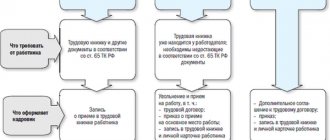Consulting lawyer › Labor law
Send
- Reasons for transfer
- Required documents and procedure
- Temporary transfer
- Initiative of the employee or employer
- Translation stages
- Refusal to transfer
Transfer to another position is possible for absolutely any employee in the enterprise. But each of the options may encounter certain problems that will affect not only the employee himself, but also his employer. Here it is important to remember the point that no matter what the emerging relationships are, they must be recorded on paper.
Reasons for transfer
When a person is transferred to another position, which will already be permanent for him, then there must be certain conditions and grounds:
- The employee can show himself on the positive side. In this case, he will be promoted and given a slightly higher salary. But if he does not pass the certification commission, then his salary will be reduced, which is due to his appointment to a lower position.
- Enterprises can change their organizational structure. For this reason, workers are transferred from one position, for example, liquidated, to a completely different one.
- An employee is also transferred to a branch of an enterprise, company, as well as to another division by territoriality.
- The staff in the organization may be reduced and positions may also be reduced.
- Vacancies for a certain position appear.
There are also certain conditions if a person is transferred to a position temporarily. And among them, the most important is when a person, the position he occupied, is replaced. In this case, an indefinite period is established. This may include illness, pregnancy, going on vacation and other issues. But it is worth noting that its duration is usually no more than one month. Otherwise, you should draw up the necessary documents and arrange a permanent transfer.
Composition and properties of the product
Cocoa is one of the most famous childhood drinks. It has not only excellent taste, but also high nutritional value. Calorie content per 100 g of dry product is about 230 kcal. The share of proteins of plant origin is at least 19 g, fats - 14 g, carbohydrates - 58 g. The rest is ash and water. As a result of this combination, the drink can quickly satisfy hunger and provide energy for a long time. In terms of zinc content, cocoa powder is second only to pumpkin seeds, and iron - to meat. The ratio of nutrients and valuable microelements is ideal for a child who is not allergic to the product. The finished drink contains a lot of dietary fiber, unsaturated fatty acids, theophylline, which helps strengthen the nervous system, and melanin, which protects against harmful ultraviolet rays.
In addition, cocoa contains folic acid, theobromine, the antioxidant flavonol, and vitamins A, E, B, and PP. Among the minerals, magnesium, calcium, fluorine, phosphorus, and potassium occupy a special place.
The main properties include the following:
- strengthening the immune system;
- formation of teeth and bone tissue;
- increased mental performance;
- rapid recovery after physical activity;
- improved mood;
- protection against free radicals;
- normalization of hematopoietic functions.
The benefits of a chocolate drink for schoolchildren include improving memory, stress resistance, and providing them with energy for the whole day. Cocoa helps with dry coughs and quickly restores strength after a cold.
Required documents and procedure
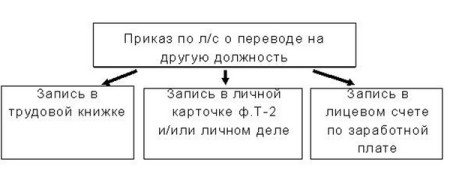
Each transfer case must be documented. The set of documents will depend on whose initiative prompted the translation. When everything appears on the part of the employer, a notification must be sent to the employee about this.
The employee may also take the initiative to transfer to another position. In this case, a statement must be received from him or a memorandum written. These documents must necessarily reflect the actual situation and the employee’s work in translation. The main thing is to justify everything correctly so that the employer does not have any doubts.
There are so-called foundation documents. These include the above, as well as a conclusion from a medical institution, adjustments to the employment contract. Based on the results of their consideration, an order must be drawn up and signed by the parties. It comes from the head of the enterprise. For him, they mainly choose a free form of writing. But in certain situations, depending on the company, there may be a form that must be approved. If we take into account the forms of orders, they can be in the form of T-5 or T-5a. In the first case, the document is drawn up when transferring one specific employee, and in the second - a group of employees.
When a transfer is made, a corresponding entry is made in the work book. This must be completed by HR staff. A personal file must also be filled out.
The initiative for transfer may come from the employer, the employee himself, or the reason may be the employee’s health condition. This is all done for a certain period, or temporarily. The latter differ somewhat from each other regarding design.
When permanently transferring an employee, an additional agreement must be concluded as an annex to the contract. The entry must also be reflected in the work book. But with a temporary one, all entries are made only in the order. No other documents are supplemented.
An employee's health condition may force him to change his position. The employer may offer him a job with easier conditions. At the same time, the salary is reduced, but in the first month the salary remains at the average value for previous periods. But this does not apply to occupational illness, when wages must remain at the same level while he occupies a new position. In each case an order must be issued.
Transfer at the initiative of the employee
The employer has the right, but is not obligated, to satisfy such a request. There are exceptions to the rule. The employer will change the essential working conditions upon application (Article 93 of the Labor Code):
- pregnant woman;
- one of the parents (guardian, trustee) with a child under 14 years of age (disabled child under 18 years of age);
- an employee who has been injured or has other health limitations;
- a person caring for a sick family member in accordance with a medical report.
The application form, the main content of which is “I ask you to transfer me from position to position,” is arbitrary.
| To the director (I.O. Last name of the manager) from (I.O. Last name of the employee) STATEMENT Please transfer me to work in (name of structural unit) department to position (name of organization) with “__” ___________ 20__ (name of new position) I have read and agree with the working conditions. Personal signature date |
The form provided as a sample contains all the basic details of a standard application:
- addressee of the appeal - name of the organization and full name. manager;
- FULL NAME. and the current position of the applicant;
- main part;
- application in the form of documents (for example, a medical report, certificate of advanced training, etc.).
The employee’s arguments and the arguments presented determine how the transfer application is written; its main part contains:
- names of the previous and new positions;
- request for transfer and its justification;
- desired term or date.
If the request is agreed upon, an additional agreement is concluded and an order is issued. Compiled in accordance with the recommendations, an example of an application for transfer to another position is as follows.
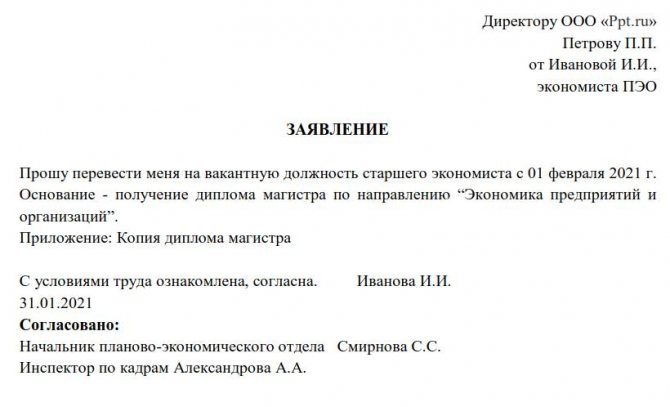
Temporary transfer
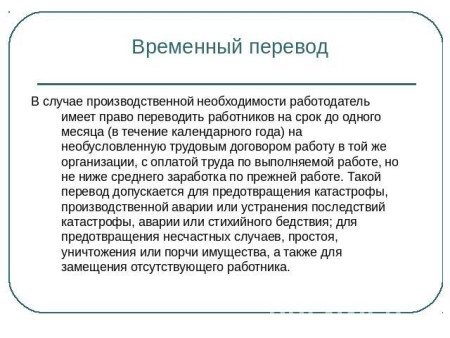
This type of transfer is carried out on the basis of the consent of the worker himself, without his approval, or by agreement of the parties. If everything is formalized by mutual agreement, then absolutely any position is chosen. But the period is limited to one year. But if a temporarily absent employee is being replaced, transfer to another job without consent may be set for the period until his return. Once this time has expired, the employee must be returned to the position he occupied before the transfer.
Appointment to another job without approval is carried out if it is related to relief from the consequences of a catastrophe, accident or accident at an enterprise, famine, fire, epidemic, as well as any other circumstances that may endanger the population, part of it. But here everything must necessarily be associated with emergency circumstances, and also so that the worker’s qualifications correspond to the position held. Otherwise, the employee’s consent must be sought. Here a period is set that cannot exceed one month, after which the employee returns to his previous job. Wages must be paid at least at the level of average earnings.
You are transferred to another job
The work day started unexpectedly. In the morning, the boss called us into his office and said that today we can forget about our points, we will have to deal with others and at another workplace. “I’m transferring you temporarily to another job.”
Transfer to another job is a change in the labor function of the employee and (or) the structural unit in which the employee works (if the structural unit was specified in the employment contract), while continuing to work for the same employer, as well as transfer to work in another location along with employer. If, as a result of the transfer, the terms of the employment contract change, the employer is obliged to obtain the employee’s consent, since it is prohibited to transfer or relocate the employee to a job that is contraindicated for him for health reasons.
The translation is carried out by agreement of the parties. Based on their duration, transfers can be divided into permanent and temporary.
In accordance with Part 3 of Art. 72.1 of the Labor Code of the Russian Federation does not require the consent of an employee to move him from the same employer to another workplace, to another structural unit located in the same area, to assign him work on another mechanism or unit, if this does not entail a change in the working conditions determined by the parties agreement.
Example.
The organization's economist, with his consent, was temporarily transferred to the position of accountant. The transfer period specified in the agreement of the parties was three months. However, after three months, the employee continued to work as an accountant and did not demand to be given his previous job. In this case, the transfer should be considered permanent. Thus, without the consent of the employee, the employer cannot transfer him again to the position of economist.
If an employee is transferred to work in another location, then the employer, in accordance with Art. 169 of the Labor Code of the Russian Federation is obliged to compensate him for:
— expenses for moving the employee, his family members and transporting property (except for cases where the employer provides the employee with appropriate means of transportation);
- expenses for settling into a new place of residence.
Transfer of an employee to another job with the same employer is permitted without the employee’s consent only in the following cases (parts 2 and 3 of Article 72.2 of the Labor Code of the Russian Federation):
- disasters of a natural or man-made nature, industrial accident, industrial accident, fire, flood, famine, earthquake, epidemic or epizootic and in any exceptional cases threatening the life or normal living conditions of the entire population or part of it, if necessary, to prevent these cases or eliminate their consequences;
- downtime (temporary suspension of work for reasons of economic, technological, technical or organizational nature), the need to prevent destruction or damage to property or to replace a temporarily absent employee, if the downtime or the need to prevent destruction or damage to property or to replace a temporarily absent employee is caused by the emergency circumstances specified above , and the need to prevent them or eliminate their consequences.
The transfer period cannot be more than one month. Even if the circumstances specified in parts 2 and 3 of Art. 72.2 of the Labor Code of the Russian Federation, continue after one month, the employer must provide the employee with the same job for at least one day.
An employee can be transferred without his consent only to a job of corresponding or higher qualifications. Transfer to a job of lower qualification requires the consent of the employee.
An employee’s work during a temporary mandatory transfer is paid based on the salary for the corresponding job, but not lower than the average earnings for the previous job (Part 4 of Article 72.2 of the Labor Code of the Russian Federation).
It is mandatory for the employer to transfer the employee to another job in accordance with a medical report (Article 73 of the Labor Code of the Russian Federation) (transfer for health reasons) and transfer to another job in case of suspension of the employee’s special right (license, right to drive a vehicle, right to carrying weapons, other special rights).
A medical report on the need to transfer to another job is issued by attending physicians of the state, municipal and private healthcare systems (see Article 49 of the Fundamentals of the Legislation of the Russian Federation on the protection of the health of citizens dated July 22, 1993 N 5487-1).
If an employee needs a temporary transfer to another job in accordance with a medical report, then the employer is obliged to transfer him to another job that is not contraindicated for this employee due to health reasons. Transfer is permitted with the consent of the employee.
The employee is paid according to the work performed (Part 1 of Article 132 of the Labor Code of the Russian Federation). However, if the new job is paid lower, then for a certain time after the transfer the employee retains the average earnings for the previous job.
If the employee does not agree to the transfer, then the employer is obliged to remove the employee from work (Part 1 of Article 76 of the Labor Code of the Russian Federation). In case of dismissal from work, the employee is not paid wages, but he retains his place of work for the entire duration of the transfer. However, the Labor Code of the Russian Federation, other federal laws, agreements, a collective agreement or an employment contract may provide for the payment of wages to a suspended employee.
If, according to a medical report, the employee should be temporarily transferred to another job for a period of more than four months, or if the employer does not have a job suitable for the employee, then the employee is dismissed under clause 8 of Art. 77 Labor Code of the Russian Federation.
An employee’s refusal to be transferred to another job should be recorded in writing.
The employer is obliged to offer the employee any available vacant position or work that the employee can perform taking into account his state of health. At the same time, positions and jobs that correspond to the employee’s qualifications are always offered first, and then all the others.
An employee’s refusal to be transferred to another job should be recorded in writing.
Suspension of a special right for a period of more than 2 months or deprivation of a special right is grounds for dismissal of an employee, clause 9 of Art. 83 Labor Code of the Russian Federation.
A special procedure for transfer in accordance with a medical report is established for heads of organizations (branches, representative offices or other separate structural units), their deputies and chief accountants. These employees are either transferred to another job with their consent, or dismissed under clause 8 of Art. 77 Labor Code of the Russian Federation. During the period of suspension from work, wages are not accrued, except in cases provided for by the Labor Code of the Russian Federation, other federal laws, collective agreements, agreements, and employment contracts.
The material was prepared on the basis of issue N13 of the Rossiyskaya Gazeta Library - “Calculation of wages and financial assistance to employees.” Those wishing to purchase this collection should transfer 98 rubles for one copy (including payment for shipping and VAT) to the following details: 125993, Moscow, JSC “Library “RG”, INN 7721017444, KPP 772101001, account number 40702810200000002764 to OJSC AKB “LE” SBANK ", Moscow, c/s 30101810500000000694, BIC 044579694, OKONH code 87100, OKPO code 36557391.
In the payment order, be sure to indicate your exact return address with a zip code and the name of the collection you are ordering: “Calculation of salaries to employees.”
Initiative of the employee or employer
If an employee wishes to move to another position on his own initiative within the same organization, then he must notify his employer about this by writing a corresponding application using the sample. It is worth noting here that based on the results of the review, a certain decision is made, which, if approved, must be reflected in the issued order. A transfer at the initiative of the employee is also formalized by the decision of the manager.
The employer himself may take the initiative to transfer the employee. The latter must be notified of all his actions. On this notice, the employee records his consent or not. In certain situations, such an entry is placed on a written order.
When an employee refuses this offer, the manager may decide to fire him. The employee can write a statement on his own or he can be dismissed due to layoffs or by agreement of the parties. Thus, the employee’s consent may not be given here.
There may be a situation when the head of a department or other division expresses a desire. In this case, additionally prepare a presentation for the employee, which indicates all his data, characteristics, and professional skills. It must be approved by the head of the organization by issuing a visa.
Reasons
The reasons for transferring to a new position within an organization may vary.
At the initiative of the employee, this most often happens:
- out of a desire to fill a vacant position that became vacant during work in the company;
- when it is no longer possible to perform their functions, for example, due to illness.
The most likely reasons for changing a position within an organization at the initiative of management are:
- production necessity or staffing reshuffle;
- reduction of staff and number of positions;
- unsatisfactory certification of the employee (inconsistency with the position held).
All reasons for the transfer must be discussed with the employee. In most cases, the issue is resolved by mutual agreement.
Translation stages
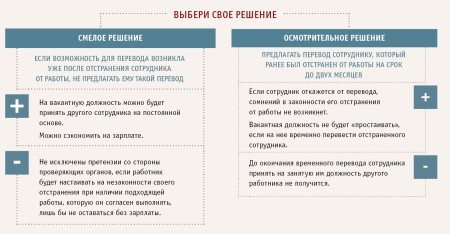
To transfer an employee to another position, it is necessary to go through a clear procedure, which consists of the following steps:
- Initiative. It must come from the employee or employer himself. This can all be expressed orally, but only if it concerns temporary translation. When it comes to permanent translation, everything must be in writing.
- If the first stage was successful, the employee should be familiarized with the new job descriptions. Most often this is done in the form of familiarization sheets, when the employee signs. It would not be superfluous to indicate here the date when the familiarization was carried out.
- Agreement. It is drawn up between two parties, the employer and the employee himself. If there is a need for this, a liability agreement is drawn up. This may also be a concluded agreement. Each document is drawn up in two copies. One of the copies is given to the employee.
- The procedure is provided for registration of the above documents.
- An order for transfer, which must be recorded in the registration journal. The employee must familiarize himself with the order upon signature, after which the corresponding decision must be reflected in the work book. But the transfer must be permanent in order to make an entry. Otherwise, you don’t need to do anything, but you can only correct your personal file.
Once all these stages have been completed, the employee can begin to perform the duties assigned to him in the new position.
Refusal to transfer
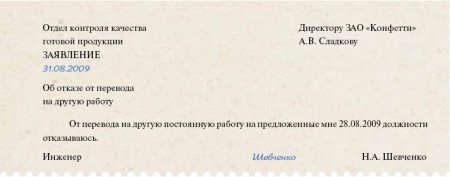
If we take into account the refusal of the proposed new position, then there must be reasons. In the first case, this concerns medical testimony. But in this option, if a new position is offered for a period of less than 4 months, the employee is simply suspended from work, without payment of wages for the entire period. When the period is more than 4 months and the employee refuses, he can simply be dismissed on the grounds prescribed in labor legislation.
In case of refusal due to staff reduction, the employee is notified of dismissal two months in advance. An employee may lose his special right to perform a particular type of work. This applies to your driver's license, license and other documents. In this case, another position is initially offered. If he refuses and is deprived of his rights or license for a period of less than two months, then he is simply suspended from work. No one will pay him his salary at this time. If the period of deprivation is more than two months, then he can be dismissed.
A pregnant woman is usually transferred to “light labor.” But she has the right to refuse even him. Here, then, she will have to be removed from her position, but her salary and place must be retained.
There are cases when an enterprise moves to another area or an employee simply wants to be transferred to another structural unit. In this case, if he refuses, he is also fired, but at the same time he receives the so-called “severance pay”.
Save
Similar articles
Rules for concluding a fixed-term employment contract
Compensation and benefits for working under hazardous working conditions
Contents and sample characteristics from the place of work
Calculation and amount of incentive payments to teachers
DO YOU NEED FREE LAWYER CONSULTATION?
Transfer to another department - how to register, is notification required?
The employer’s actions to formalize a change in the unit in which the employee is registered depend on the specific situation. There can be 3 options:
- If the department is mentioned in the text of the employment contract, you must act in the same way as when changing the position.
- If there is no indication of the unit in the contract, but as a result of the transfer any of the conditions specified in it change (for example, obligations), it is necessary to act similarly to clause 1.
- If there is no indication of the unit in the contract, but the labor function and other working conditions established by the contract remain unchanged after the transfer, the change of unit is recognized as a relocation. There is no need to seek the employee’s consent in this case, or to notify him in advance (Part 3 of Article 72.1 of the Labor Code of the Russian Federation) - it is enough to issue an order to move.
An article on the ConsultantPlus website describes what nuances need to be taken into account when transferring an employee to another separate department. If you do not yet have access to the ConsultantPlus system, you can obtain it free of charge for 2 days.
Subscribe to our newsletter
Yandex.Zen VKontakte Telegram









